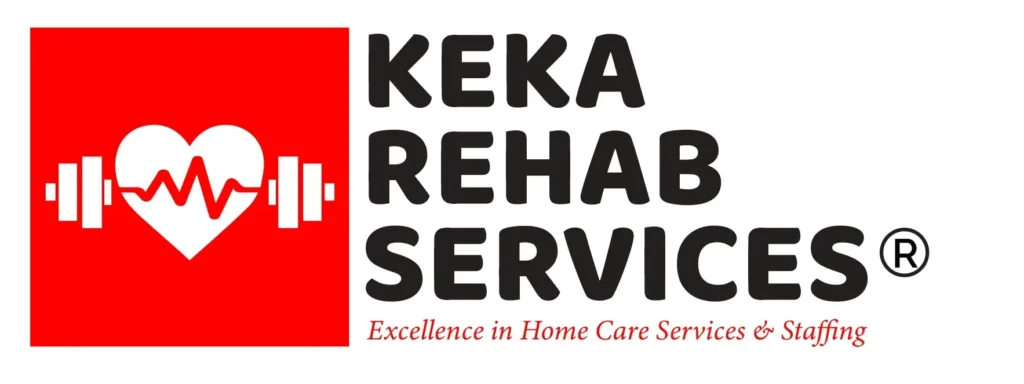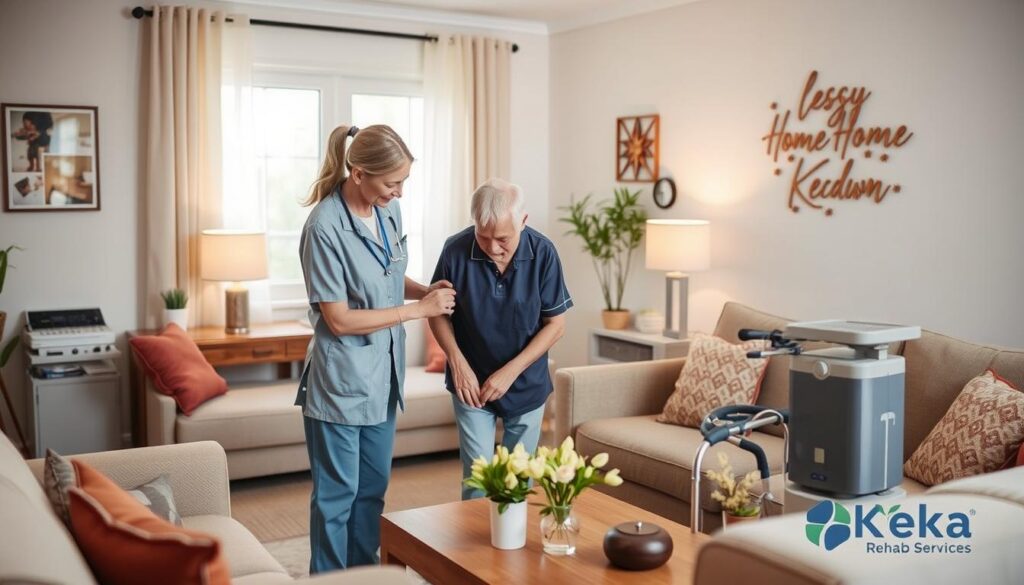Did you know that over 90% of seniors want to stay in their homes as they age? This shows how crucial quality home care services are for our ageing population. Families now seek trustworthy, tailored care options for their elderly loved ones.
Keka Rehab Services has over 17 years of experience in professional homecare and private nursing. They are a top choice for elderly care and in-home help in the Greater Boston Area.
Safety and trust are essential for seniors in senior living and home care. Keka Rehab Services thoroughly check their caregivers. Many providers offer various care options, including Medicare home care and personal home care services.
Keka Rehab Services has a team of skilled nurses for support. This expertise helps them build strong relationships with patients and provide excellent in-home help.
Key Takeaways
- Most seniors prefer aging in their own homes
- Keka Rehab Services offers personalized, in-home assistance
- Experienced providers cover multiple regions and provide various care types
- Rigorous caregiver screening ensures safety and reliability
- Professional nursing staff support high-quality care delivery
- Home care services cater to diverse needs across different locations
Understanding Home Care Services
Home care services help seniors and those with health issues stay independent. They offer care in the comfort of home, allowing people to live comfortably and safely.
Types of Home Care Services
Home care includes many services, like skilled nursing and personal care aides. Medicare covers home health services for those needing part-time skilled care, up to 8 hours a day and 28 hours a week.
Home health care is clinical care provided by licensed professionals. Home care is non-clinical support from caregivers.
Benefits of In-Home Care
In-home care gives seniors personal attention and helps families get a break. It lets seniors stay in their own homes, keeping their daily routines. Some government programs and health insurance cover home care, making it easier for families.
Many people also pay out-of-pocket or use long-term care insurance for these services.
Importance of Personalized Care Plans
Everyone’s needs are different, so personalized care plans are essential. When someone needs home health services, agencies assess and discuss health needs. They then work with doctors to make care plans just for that person.
These plans ensure that home health staff visit as needed and provide the right support. They also keep doctors updated on the patient’s progress.
Daily Living Assistance: Maintaining Independence
Home health and personal care aides are crucial to helping seniors stay independent. They help with daily tasks that many older adults find hard to do alone. For example, over 20% of seniors aged 85 and older need help with these tasks.
These tasks include bathing, dressing, and keeping clean. Personal care aides offer respectful help with these individual activities. They also assist with moving around, eating, and using the bathroom, which is vital for seniors to feel independent.

Home health aides also help with more complex tasks, such as cooking, managing medicines, and cleaning the house, which helps seniors stay in their homes.
This support is critical. Losing the ability to do daily tasks can lead to more hospital visits and mental decline in older adults. By keeping seniors able to do things independently, aides can lower healthcare costs and improve life quality.
It’s critical to check how well seniors can do daily tasks regularly. These checks help determine how much care they need and whether more support or moving to a care facility is necessary. Everyone involved in the senior’s care has a significant role in these checks.
Companionship and Engagement: Enhancing Quality of Life
Companion care is critical in senior living, helping seniors make friends and stay well. Home care services offer chats and emotional support to stop seniors from feeling alone. This makes life better and helps with both physical and mental health.
Social Interaction and Conversation
Talking regularly can slow down memory loss in older people, showing how important it is to have friends. Caregivers have deep talks and do fun activities to keep their minds sharp and spirits high. This keeps seniors’ social skills sharp and makes them feel important.
Engagement in Hobbies and Interests
Companion care lets seniors follow their dreams and try new things. Doing fun activities keeps them feeling purposeful and happy. Caregivers work with seniors to set goals and choose activities they like.
Accompanying to Appointments and Social Outings
Caregivers accompany seniors to doctor’s visits, social events, and community activities. This helps seniors stay in touch with loved ones and stay safe. The support from in-home care services gives seniors and their families a lot of emotional help.
Companion care improves the quality of seniors’ lives in their homes by focusing on real friendships and fun activities.
Home Management and Safety Support
Home management and safety support are essential for seniors. Caregivers ensure the home is clean, organized, and safe, help with daily routines, and prevent accidents.

Light housekeeping is a big part of home management. Caregivers do tasks like dusting, vacuuming, and organizing. They also help with laundry and keeping things fresh.
This lets seniors live comfortably without worrying about cleaning. It’s a big help.
Safety is paramount in caregiver support. They help seniors move safely and prevent falls. They also check for safety risks in the home.
In-home assistance also includes personal care. Caregivers help with moving and keeping seniors comfortable. They also check on seniors’ health and well-being, which is very important for seniors with health issues who can’t move quickly.
Home healthcare agencies are vital in offering these services. In the U.S., over 8,090 agencies help more than 2.4 million seniors and disabled people annually. These agencies provide many services, from basic help to exceptional care.
Choosing home management and safety support helps seniors stay independent. It also improves their overall well-being and quality of life as they age at home.
Choosing the Right Home Care Provider
Choosing the best home care services for elderly care is crucial. It’s about making sure your loved one is comfortable and well-cared for, and you must make an informed choice.
Qualifications and Certifications
Make sure the provider has the proper state certifications and licenses. This means they follow the law and meet industry standards. Also, check if they do background checks on their staff. Good providers use tools like Home Care Pulse to check their support and how well caregivers do.
Experienced and Trained Caregivers
It’s important to have caregivers with experience in quality care. They must finish at least 75 hours of training. Ask if the agency keeps its staff updated with new practices.
Evaluating Reputation and Reviews
Look into the agency’s reputation. Agencies that are part of a franchise are often well-known because of their marketing. Independent agencies might offer more personalized care. Ask for references and read reviews online to see how happy clients are.
Also, find out about payment options. Medicare, Medicaid, Veterans Benefits, or long-term care insurance might cover some services. By looking at these things, you can find a provider that suits your loved one’s needs and gives you peace of mind.
Home Care Services: Tailored to Individual Needs
Home care services offer a wide range of support, like personal care, companionship, and skilled nursing care. These services are made to fit each person’s unique needs and likes. About 12 million people in the U.S. get some home health care, showing it’s a popular choice.
Personalized care plans have significant benefits. They help people stay independent, improve their quality of life, and give families peace of mind. Eighty per cent of those getting home health care are happier with it than with care in a facility. This happiness comes from the flexibility and personal attention they get at home.
Knowing that 65% of those getting home care are 65 or older is critical. Signs these seniors might need home care include having trouble with daily tasks, feeling lonely, and worrying about safety. Tailored care plans help reduce hospital readmissions by 25%. This shows how effective in-home care can keep people healthy and happy.
FAQ
What types of home care services are available?
Home care services offer many options. These include skilled nursing, physical therapy, and occupational therapy. Seniors can also get speech therapy and home health aides. These services help seniors stay healthy and independent at home.
What are the benefits of in-home care for seniors?
In-home care allows seniors to stay in their own homes. It gives them personalized support that meets their needs, helping improve their well-being and quality of life.
What is the importance of personalized care plans?
Personalized care plans are made with input from the seniors, their families, and healthcare providers. They ensure seniors get the proper support and that their care fits their needs.
What types of daily living assistance are provided?
Daily living assistance covers personal hygiene and dressing. It also includes meal prep and medication reminders. These services help seniors stay independent and comfortable at home.
How do companionship services enhance a senior’s quality of life?
Companionship services improve seniors’ lives through social interaction and hobbies. They also go with seniors to appointments and outings. These activities fight loneliness and boost mental health.
What home management and safety support services are offered?
Home management services include housekeeping and laundry. Safety support helps with mobility and prevents falls. These services ensure seniors live in a clean, safe home.
What qualifications and certifications should I look for in a home care provider?
They should be licensed, bonded, and insured. Check if they’re registered with state agencies. The Joint Commission accreditation is also a sign of quality.
Why are experienced and trained caregivers necessary?
Experienced caregivers with ongoing training are crucial to quality care. They are well-equipped to handle the unique needs of seniors at home.
How can I evaluate a home care provider’s reputation?
Check a provider’s reputation through client reviews and testimonials. Choose providers known for excellent care and strong client relationships.








